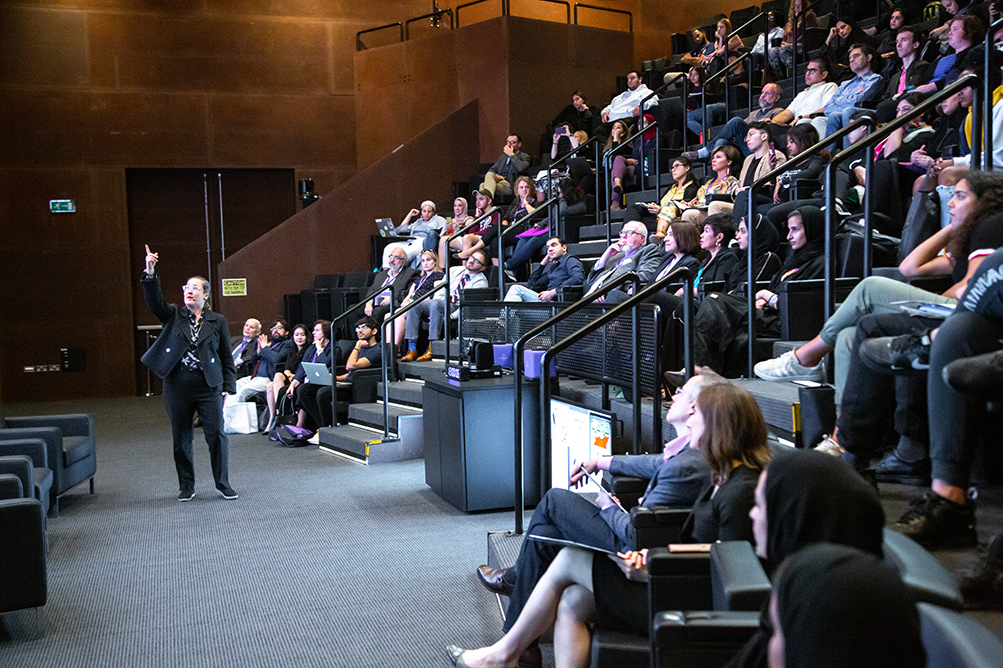A U.S. Naval Academy professor claimed that “media tools are as powerful as a fully-loaded gun” in creating social and political change. Deborah Wheeler, author of Digital Resistance and New Media Activism in the Middle East, claimed during a lecture at Northwestern University in Qatar (NU-Q) that digital connectivity has encouraged new “forms of resistance against the norm.”
Wheeler spoke at the annual lecture hosted by the Media and Politics minor program, a joint program with Georgetown University in Qatar that enables students to better understand how politicians, governments, and citizens influence, and are themselves influenced by, the media in its myriad forms and formats.
During her lecture, Wheeler discussed her empirical research on the impact of the internet and new forms of communication on societal and political change across the MENA region from 1996 – 2014.
Digital Resistance and New Media Activism in the Middle East explores the role of interconnectivity and the rise of the internet on empowering citizens’ voices and promoting activism, reform, and resistance. The book portrays how social media and other forms of digital communication have enabled citizens to route around the state and other forms of power in their lives, and suggests that this could lead to the reconfiguration of power and societal structures in the Middle East.
In 1996, Wheeler traveled to Kuwait to study the aftermath of the Gulf war, as it recovered from having its entire communication infrastructure destroyed by the Iraqi occupation. “The only reason Kuwait survived, in terms of the resistance on the ground, was because of a few fax machines, and the one mobile phone that one member of the resistance had,” Wheeler said.
The Kuwaiti government’s response to the war was to “rebuild its communications infrastructure ensuring that every student has access and can use the internet; their satellite footprint is wide and diversified; and that there was a fax machine in every home,” she added. “Today, Kuwait is one of the most connected countries in the world in terms of the level of internet penetration per person, along with Qatar and the United Arab Emirates.”
Continuing her research on people’s behaviors and media patterns in the Arabian Gulf as well as Jordan, Syria, and Egypt, Wheeler concluded that there were four “phases of transition” that were felt across the region as it shifted to an internet society.
The first, she said, was fear and “entering a new world of unknowns, while being concerned about the potential threats [that the Internet] might have on Islamic values and conservative cultures." Secondly, the countries moved to a phase of needing to remain competitive and stay on top of economic innovations so that they would be able to contribute to the nation’s social and economic development.
The third phase was resistance. The internet was “giving people the power to make better-informed decisions and gather information freely,” Wheeler said. Her interviews with more than 1,100 internet café users found that people in the Middle East were using the web to access culturally sensitive content, expand on their relationships, or to “escape boredom,” she added.
Finally, the countries moved into a phase she called revolution. At this stage, “geographical boundaries had no impact on one’s participation in a political campaign and propaganda was spreading quickly.” Wheeler gave an example of a political campaign against the Syrian regime, where people from around the region were participating through financial donations or by sharing the campaign with friends and family.
Wheeler concluded by saying that she thinks the next phase in this evolution will be repression. The bottom line, Wheeler said, was determining whether there is a shift taking place and whether “governments and giant corporations are recognizing patterns and behaviors through big data analytics to respond and control behavior?”
Wheeler received her Ph.D. in political science with a focus on the Middle East from the University of Chicago. She joined the Naval Academy’s Department of Political Science in 2005 after having held several other positions in academia and working for the United Nations Development Program in Amman, Jordan. She has been awarded many grants, including two Senior Fulbright Research Grants to the Middle East, as well as a research grant from Georgetown University Center for International and Regional Studies, Qatar. Wheeler was also a research fellow at Oxford University.

